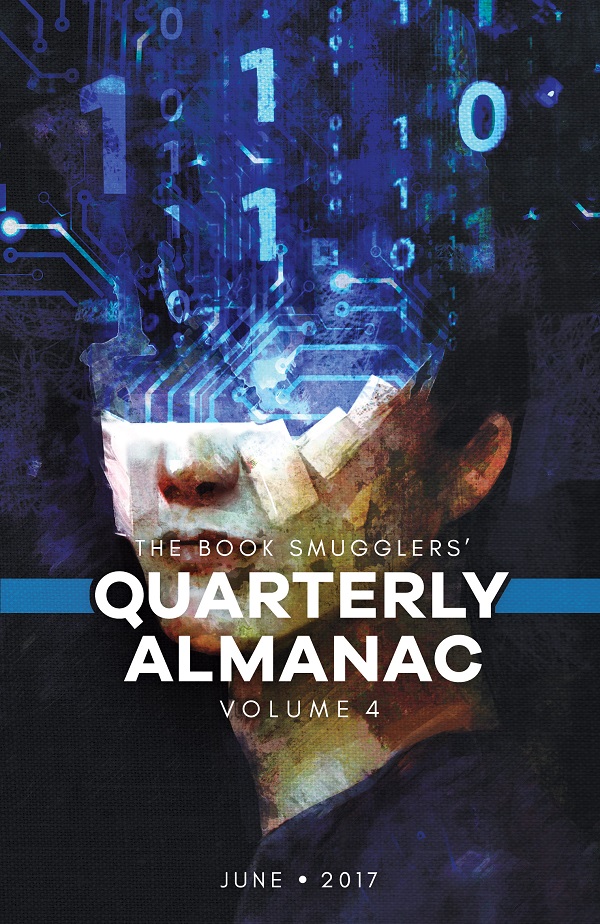A Digression About Storytelling, Narratives, and Diversity is an essay by Brazilian author and essayist Bárbara Morais that first appeared in the fourth volume of our Quarterly Almanac.

A Digression About Storytelling, Narratives, and Diversity
When I was in college, I had one class about writing. I have a degree in Economics, so it was a surprise when my Projects teacher opened her presentation and started babbling about sentences, structures and style. It was nothing new to me—I thought—and then she came to a part where she started to talk about narrative. About the way people think and the way they put their thoughts into the paper.
I had never given much thought about it until that class. She showed us how the anglophonic way of writing was the most prized one in the scientific scene, specially in the Economics field as it went straight to the point: “John Doe killed a guy in Bolivia”. And people that speak languages that have latin roots, like us, who speak Portuguese, are used to digress: “Do you know John Doe, that guy who was friends with my grandma’s cousin, and whose mother died in that terrible accident? Oh, gosh, his father, the Colonel, got married last year! It was a terrible affair, John fell in love with his stepmother and they ran away to Bolivia. John got involved in a shady business, something to do with stolen trucks, and is in a bad, bad shape, the poor guy. Last thing we heard, he killed someone!” And then she moved on to show us how in Arabic language, people use spiral narratives to communicate. A story gives birth to another, that gives birth to another. It was fascinating!
More or less at that time, I read The Ghost Bride, by Yangsze Choo. It had just came out in Brazil and the reviews were mostly negative. People complained that nothing happened in the book. I began reading and right away I got pissed off at those comments because everything happens in the book. It just doesn’t have the usual fast paced storytelling we’re used to, in which everything is explained and explicitly showed. Lots of aspects are left to the imagination, the journey is more important than the destination itself. It reminded me a lot of one of my favorite movies, Spirited Away, and all the narratives I grew up with while reading manga and watching several anime. That’s when I realized—people were just not used to that way of telling a story.
In recent years we have seen all kinds of talks about diversity, and this is one topic I don’t see that often amid these discussions. There’s a Ted Talk by Chimamanda Ngozi Adichie that I love so much, about “The Danger of a Single Story”, where she tells us how it was for her to grow up reading books written by British and North American authors as a Nigerian girl and how it’s dangerous to think there’s only one kind of story to tell, the one about white kids who eat apples and have snowy Christmas and 9 to 3 school schedules. But I’d go further: it’s dangerous to think there’s only one way to tell a story. The narrative matters as much as the content. It feels empty to read a novel that takes place in a fantasy land inspired by Arabic myths, but that’s told in the same style an American or a British tale. It feels fake, it feels void. Worldbuilding isn’t only about deciding rules to your world, it’s also about storytelling.
Each language and culture has its own logic that leads to a particular way of thinking and communicating. This reflects directly in the stories they tell, in their myths, in the way they ask and answer questions. It also has impact in other spheres of life. For instance, there’s a really interesting article by Keith Chen that was published in AMERICAN ECONOMIC REVIEW that shows that language has a direct correlation with economic behaviour—cultures with languages that have no distinction between present and future tenses tend to save more money than the others. I’m learning Japanese, and the concept that the present and the future are written in the same tense, is the most difficult for me to grasp. My teacher keeps saying to me that it doesn’t matter if it’s today or tomorrow, but I keep asking her how do people know if something will take place in the future or now. She tells me it’s very simple and it’s always clear, but it’s hard to come to terms with this kind of structure when I was raised speaking a language that has three verbal tenses just to describe things that will happen in the future.
While learning new languages, we live this difference. It’s not only about grammar and vocabulary, it’s also about learning to think like the native speakers, understanding how they make sentences and listening to how they tell stories. And I think that, as storytellers and writers, it is our duty to understand how different languages and cultures have a different impact in the way people think and express themselves, and put that in our work, especially, and more importantly, if we choose to take inspiration from real life cultures that are not our own. When we try to emulate cultures in our writing and forget that there’s more than what we see from afar, that there’s cultural value in the way grandmothers tell stories to their granddaughters, that there’s living history in a backyard barbecue party, we fail to represent important aspects of a society, facts that won’t be available in history books, and we fail to present a new worldview to our readers—so we have the obligation to dig deeper and translate that into our stories.
![]()
Bárbara Morais is a Brazilian YA author/economist that loves equations as much as she loves words. Her most dashing abilities are having too many ideas at the same time and poor time management. She can be found fangirling at twitter (@barbaraescreve) and writing about books and stuff at her blog, Nem Um Pouco Épico, all in Portuguese. Her first trilogy is Trilogia Anômalos, published by Editora Gutenberg, which deals with prejudice, segregation, police brutality and democracy. In English, you can find some of her essays around the internet.
![]()
THE BOOK SMUGGLERS’ QUARTERLY ALMANAC

A quarterly collection of awesome, selected and edited by The Book Smugglers
Collecting original short fiction, essays, reviews, and reprints from diverse and powerful voices in speculative fiction, THE BOOK SMUGGLERS’ QUARTERLY ALMANAC is essential for any SFF fan.
IN THIS VOLUME (JUNE 2017):
-
A.E. ASH
(With a brand new story called “Nice”, set in the world of the upcoming novella Temporary Duty Assignment)
FOZ MEADOWS
(An essay, about Slipfic)
OCTAVIA CADE
(A reprint of the author’s award-nominated short story “The Mussel Eater”)
GABRIEL SQUAILIA
(An essay, on body horror and coming out as trans)
BÁRBARA MORAIS
(An essay, on diversity and language)
YUKIMI OGAWA
(A new short story called “Nini” about an AI, a space station and an old goddess. The cover art is based on “Nini”)
BOGI TAKÁCS
(An essay, on superhero registration tropes, power fantasies and Western-centrism)
YOSIA SING
(A new short story, “El Periodista y la Guerrera”, a story featuring LGBTQIA superheroes fighting for justice for marginalized groups)
SARAH KUHN
(An essay, on romance, women who lust and The Courtship of Princess Leia)
ANA GRILO
(A review of Bitch Planet volume 2)
THEA JAMES
(An essay, Where to Start With the Star Wars Expanded Universe)
How To Procure Your Copy of The Almanac
The Almanac is available now with major retailers – Get your copy by using the links below.
Buy the Book:









5 Comments
Kathryn Gossow
August 26, 2017 at 5:16 amThis is so interesting. I recently read a reference (I can’t remember where) to Australian Indigenous writers who had their books edited to fit with what was considered a more – I am not sure which word to use – standard, usual, accepted? – narrative. Being so Anglo I had not even considered there was a different way.
Loose-leaf Links #47 | Earl Grey Editing
September 7, 2017 at 6:03 pm[…] Over at the Book Smugglers, Barbara Morais talks about the necessity of being familiar with culturally different forms of narrative. […]